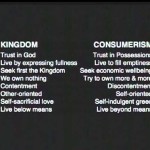We run our website the way we wished the whole internet worked: we provide high quality original content with no ads. We are funded solely by your direct support. Please consider supporting this project.
The Image of Cross-Like Love: God’s Self-Portrait, Part 6
In the previous blog I argued that God is cross-like love. In this blog I’d like to take this a step further by demonstrating why the cross alone could function as the definitive revelation of God’s true character and by showing how this revelation weaves together everything Jesus was about.
If you want to know the quality of someone’s love for you, measure the depth of their sacrifice for you. Love is not an inner disposition that has no behavioral implications. Love is expressed in action — costly action. On the cross, God went to the furthest extreme possible for us, making the greatest sacrifice possible for us. Think about it. On the cross, God not only stooped to identify with our humanity, but the all-holy God went to the extreme of stooping to become our sin (2 Cor 5:21) and the God who is perfectly united in loved stooped to become our God-forsaken curse (Gal.3:13). This means that on the cross, God went to the extreme of experiencing his own antithesis, and in doing so, he could not have gone one centimeter further than he did. And the unsurpassable extremity of God’s sacrifice for us – a race of people who could not deserve it less – reveals the unsurpassable perfection of his loving character.
Once you understand the logic inherent in God’s self-revelation on the cross, you can see why it alone can constitute the quintessential revelation of God’s self-sacrificial character. No event in all eternity could more unambiguously disclose the perfection of the other-oriented love that God is. To state it in the form of Anselm’s ontological argument, the cross is that revelation greater than which none other can be conceived.
Because the cross is the quintessential expression of the character of the God that Jesus reveals, it also is the thematic center of Jesus’ life, teachings and actions. From his incarnation to his healing and teaching ministry to his death, resurrection and ascension, Jesus was revealing the cross-like love of God. We can see this very clearly in Jesus’ teaching in the Sermon on the Mount.
“You have heard that it was said, ‘Eye for eye, and tooth for tooth.’ But I tell you, do not resist an evil person. If anyone slaps you on the right cheek, turn to them the other cheek also… I tell you, love your enemies and pray for those who persecute you, that you may be children of your Father in heaven. He causes his sun to rise on the evil and the good, and sends rain on the righteous and the unrighteous. (Matt 5:38-9, 44-5).
Notice that Jesus taught that refusing to retaliate and choosing to instead love and bless our enemies was the precondition for being considered a child of the Father. And the reason is that children of the heavenly Father must reflect his character. The cross reveals that God doesn’t return force for force but instead gives his life out of love for enemies. Therefore, his children must refuse to return force with force and chose instead to love and sacrifice for their enemies. The Apostle Paul made the same point when he said, “Imitate God. Live in love as Christ loved you and gave his life for you” (Eph 5:1-2).
God is not one who says, “Do what I say, not what I do.” If he commands us to refrain from violence and instead love enemies, it’s because his own loving nature leads him to refrain from violence and instead love enemies (the OT violent portraits of God notwithstanding). And this is precisely what the cross reveals about God. God’s children are called to non-violent, enemy-serving, self-sacrificial love because this love alone conforms to the true character of the God who is revealed on the cross.
Everyone eventually imitates the kind of God they envision. So, if we hope to grow into the kind of people who imitate God’s love, revealed on the cross, we must commit to basing our mental picture of God on the cross, which alone is the perfect revelation of God’s true character. To the degree that we embrace less beautiful pictures of God, our lives will fall short of the beauty of self-sacrificial love that Christ calls us to.
Category: Essays
Tags: Cruciform Theology, Enemy Love, Essay, God is Love, Kingdom Living, Love
Topics: Christology, Interpreting Violent Pictures and Troubling Behaviors
Related Reading

Cruciform Aikido Pt 2: God-Forsaken Judgment
So if Jesus is the supreme revelation of what God is like, as we explained in our last post, what does that tell us about the nature of God’s judgment?
As Jesus was dying on the cross he cried out, “Eli, Eli, lema sabachthani?,” which means, “My God, my God, why have you forsaken me?” (Mt. 27:46). This shocking cry reveals…

Is Jesus Unique?
The Search for a Non-Unique Jesus Built into the naturalistic assumption that drives the liberal New Testament search for the “man behind the myth” is the notion that, whoever Jesus was, he cannot have been utterly unique. The laws that operate in the world today, including the laws of human behavior, have always operated. And…

Confronting the Divine Montage
The superiority of Jesus’ revelation over a montage view of God (see previous post) is captured when Paul and the author of Hebrews utilize an analogy of a shadow verses reality. Paul instructs his disciples not to “let anyone judge you by what you eat or drink, or with regard to a religious festival, a…

Caught Between Two Conflicting Truths
In my previous blog I tried to show that adopting a “Christocentric” approach to Scripture isn’t adequate, as evidenced by the fact that people adopting this approach often come to radically different conclusions. In fact, it seems to me that the “Christocentric” label is often close to meaningless inasmuch as it doesn’t meaningfully contrast with anything. If a “Christocentric”…

Contemplating Food Choices
As many of you know, Shelley and I have been vegetarians for the last eight years or so. This is a personal conviction, not a doctrine, but there are compelling reasons for adopting this lifestyle. The main conviction that led me to quit eating meat was that I felt I should never kill anything out of convenience…

Consumer Wars: Sermon Clip
To go along with our other post today, here’s a clip from Greg’s sermon last week. If you don’t have any financial margin in your life, this might have something to do with it. You can find the entire sermon here.
